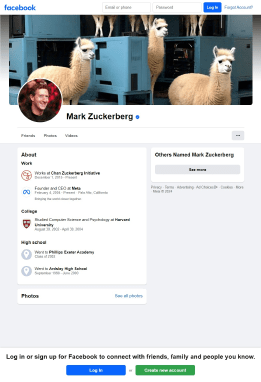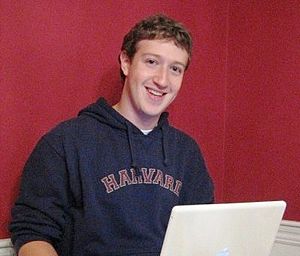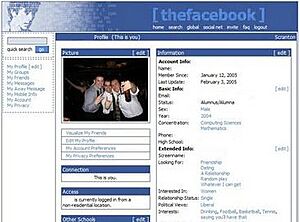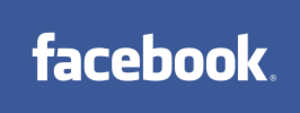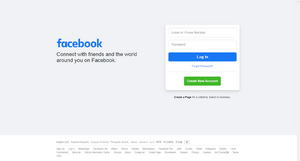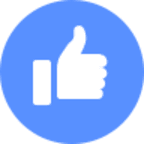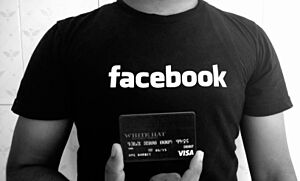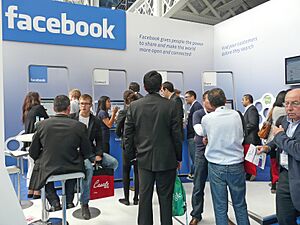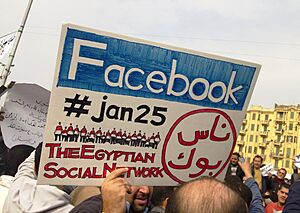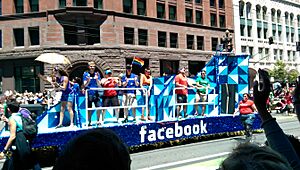Facebook facts for kids
Logo used since September 2023
|
|
|
Type of site
|
Social networking service |
|---|---|
| Available in | Multilingual Afrikaans, Albanian, Amharic, Arabic, Armenian, Assamese, Azerbaijani, Basque, Belarusian, Bengali, Bosnian, Breton, Bulgarian, Burmese, Catalan, Cebuano, Corsican, Croatian, Czech, Danish, Dutch, Dutch (België), English (UK), English (US), English (upside down), Esperanto, Estonian, Faroese, Filipino, Finnish, French (Canada), French (France), Frisian, Fula, Galician, Georgian, German, Greek, Guarani, Gujarati, Haitian Creole, Hausa, Hebrew, Hindi, Hungarian, Icelandic, Indonesian, Irish, Italian, Japanese, Japanese (Kansai), Javanese, Kannada, Kazakh, Khmer, Kinyarwanda, Korean, Kurdish (Kurmanji), Kyrgyz, Lao, Latvian, Lithuanian, Macedonian, Malagasy, Malay, Malayalam, Maltese, Marathi, Mongolian, Nepali, Norwegian (bokmal), Norwegian (nynorsk), Odia, Pashto, Persian, Polish, Portuguese (Brazil), Portuguese (Portugal), Punjabi, Romanian, Russian, Sardinian, Serbian, Shona, Silesian, Simplified Chinese (China), Sinhala, Slovak, Slovenian, Somali, Sorani Kurdish, Spanish, Spanish (Spain), Swahili, Swedish, Syriac, Tajik, Tamazight, Tamil, Tatar, Telugu, Tetun, Thai, Traditional Chinese (Hong Kong), Traditional Chinese (Taiwan), Turkish, Ukrainian, Urdu, Uzbek, Vietnamese, Welsh and Zaza |
| Founded | February 4, 2004 in Cambridge, Massachusetts, US |
| Area served | Worldwide, except blocking countries |
| Owner | Meta Platforms |
| Founder(s) |
|
| CEO | Mark Zuckerberg |
| Registration | Required (to do any activity) |
| Users | |
| Launched | February 4, 2004 |
| Current status | Active |
| Written in | C++, Hack (as HHVM) and PHP |
Facebook is a popular American social media and social networking service. It is owned by a company called Meta. Mark Zuckerberg and four other students from Harvard College created Facebook in 2004. Its name comes from "face books," which were directories with photos of students, often given out at American universities.
At first, only Harvard students could join Facebook. Then, it slowly opened up to other universities in North America. Since 2006, most people aged 13 and older can sign up for Facebook. In some countries, the age limit is 14. As of December 2023, Facebook had almost 3.07 billion active users every month around the world. In November 2024, Facebook was the third most visited website globally.
You can use Facebook on devices like personal computers, tablets, and smartphones if they have Internet access. After you sign up, you can create a profile and share information about yourself. You can post text, photos, and videos. These posts can be shared with your "friends" on Facebook or, if you choose, with everyone.
Users can also chat directly with each other using Messenger. You can join groups based on shared interests. Facebook also sends you notifications about what your friends and pages you follow are doing.
Facebook has faced criticism for several reasons. These include concerns about user privacy, how it might be used to spread fake news, and hate speech. Some people also worry about it causing addiction or low self-esteem.
The History of Facebook
Facebook started as a website for college students. It grew into a huge global social network. Before Facebook, Mark Zuckerberg created a site called "Facemash" in 2003. It let users compare photos of students.
In January 2004, Zuckerberg began coding a new site called "TheFacebook." He saw that technology could easily create a central website with many benefits. He teamed up with Harvard student Eduardo Saverin, and they each invested $1,000. "TheFacebook" officially launched on February 4, 2004.
At first, only students from Harvard College could join. Soon, Dustin Moskovitz, Andrew McCollum, and Chris Hughes joined Zuckerberg to help manage the site's growth. It then became available to most universities in the US and Canada. In 2004, Sean Parker became the company president. The company moved to Palo Alto, California. Peter Thiel gave Facebook its first investment. In 2005, the company bought the domain name Facebook.com and dropped "the" from its name.
In 2006, Facebook opened up to anyone at least 13 years old with a valid email address. Facebook added important features like the News Feed. This feature became key to how users interacted with the site. By late 2007, Facebook had 100,000 pages for companies to promote themselves. Facebook became more popular than MySpace. It became the most popular social media platform in the world.
Microsoft bought a small share of Facebook for $240 million in 2007. This showed that Facebook was becoming very valuable. Facebook made money by showing targeted advertising based on what users liked. This helped it grow very quickly. In 2012, Facebook became a public company. This was one of the biggest IPOs in tech history.
Facebook also grew by buying other companies. In 2012, it bought Instagram. Then, in 2014, it bought WhatsApp and Oculus VR. This helped Facebook expand beyond just social networking into messaging and virtual reality. Mark Zuckerberg also announced a large investment in Meta AI.
In 2018, the Facebook–Cambridge Analytica data scandal happened. This showed that user data was misused to try and influence elections. This caused a lot of anger and led to fines and hearings. Facebook has also played a role in global events. It helped organize movements like the Arab Spring. It also had an impact on events like the Rohingya genocide in Myanmar. These events show that Facebook can be used for both good and harm. In 2021, Facebook changed its company name to Meta. This showed its new focus on building the "metaverse" and working on virtual and augmented reality.
Facebook Features
Facebook posts can be quite long. They can also include images and videos. Videos can be up to 240 minutes long and 10 GB in size.
Users can "friend" other users. Both people must agree to be friends. Posts can be set to be seen by everyone (public), only friends, people in a certain group, or only selected friends (private). Users can join groups. Groups are for people with shared interests. For example, they might like the same sport or live in the same area. Posts in a group are usually only seen by group members, unless they are set to public.
Facebook users can also buy, sell, and trade items on Facebook Marketplace. They can also do this in special "Buy, Swap and Sell" groups. Facebook also lets users advertise events. These events can be offline, on another website, or on Facebook itself.
Website Details
Facebook's main color is blue. This is because Mark Zuckerberg is red–green colorblind. He found this out around 2007. Facebook was first built using PHP. This is a programming language used for making websites. PHP helped them create and launch Facebook quickly. As Facebook grew, they developed new tools like the HipHop Virtual Machine (HHVM) to make PHP work even better.
The website also upgraded from HTTP to the more secure HTTPS in January 2011.
Your Profile and Timeline
Every registered Facebook user has a personal profile. This profile shows their posts and content. In September 2011, the look of user pages changed. It became known as "Timeline." This is a timeline of a user's stories, including updates, photos, and events. Users could also add a "cover photo." More privacy settings were added.
In 2007, Facebook launched "Facebook Pages." These are for brands and celebrities to connect with their fans. In June 2009, Facebook added "Usernames." This let users choose a unique name for their profile's web address. This made it easier to share.
In February 2014, Facebook added more gender options. Users could choose from many different gender identities. They could also pick which pronouns should be used for them on the site. In May 2014, Facebook added a feature to ask for information not shared by other users. If a user didn't share their location or relationship status, others could click an "ask" button to send a message about it.
News Feed
The News Feed is on every user's homepage. It shows updates like profile changes, upcoming events, and friends' birthdays. At first, some users didn't like the News Feed. They thought it was too messy or made it too easy for others to track their activities. Mark Zuckerberg apologized for not having enough privacy features. Now, users can control what information is shared with friends. They can also stop certain friends from seeing updates about specific activities.
On February 23, 2010, Facebook received a patent for parts of its News Feed. This patent covered News Feeds where links let one user join another user's activity. The way stories are sorted and shown in your News Feed is controlled by the EdgeRank algorithm. The Photos feature lets users upload albums and photos. Each album can hold 200 photos. You can set privacy for each album. Users can also "tag" friends in a photo. The tagged friend gets a notification with a link to the photo.
On June 7, 2012, Facebook launched its App Center. This helped users find games and other applications. On May 13, 2015, Facebook launched "Instant Articles" with news portals. This allowed news to be read directly on Facebook without leaving the site. In January 2017, Facebook launched Facebook Stories for iOS and Android. Like Snapchat and Instagram stories, this feature lets users upload photos and videos that appear above friends' News Feeds and disappear after 24 hours.
On October 11, 2017, Facebook added 3D Posts. This allowed users to upload interactive 3D items. In January 2018, Facebook announced it would change the News Feed. It would show more content from friends and family. It would show less content from media companies. In February 2020, Facebook said it would spend $1 billion to license news from publishers for three years. This was in response to concerns about not paying for news content.
In March and April 2021, Apple made changes to its iOS device's privacy policy. Apps now had to ask users if they wanted to be tracked. Facebook bought full-page newspaper ads to try and convince users to allow tracking. They said it helped small businesses. However, Apple released iOS 14.5 in April 2021 with this feature. Statistics showed that most iOS users chose not to allow tracking. Facebook said the new policy would be "manageable."
Like Button
The "like" button, shaped like a "thumbs up," first appeared on February 9, 2009. It lets users easily interact with posts, comments, photos, videos, and ads. When you click "like," that content is more likely to show up in your friends' News Feeds. The button also shows how many other users have liked the content. In June 2010, the like button was added to comments.
In February 2016, Facebook added "Reactions." This let users choose from five emotions: "Love," "Haha," "Wow," "Sad," or "Angry." In April 2020, during the COVID-19 pandemic, a new "Care" reaction was added.
Instant Messaging
Facebook Messenger is a messaging service and app. It started as Facebook Chat in 2008. It became a separate mobile app in August 2011. Messenger lets users make one-on-one and group voice and video calls. Its Android app supports SMS and "Chat Heads." These are round profile photo icons that appear on your screen no matter what app you are using. Both apps support multiple accounts and chats with optional end-to-end encryption.
In 2017, Facebook added "Messenger Day." This feature lets users share photos and videos in a story format with friends. The content disappears after 24 hours. "Reactions" let users tap and hold a message to add an emoji reaction. "Mentions" let users in group chats type @ to notify a specific person.
In April 2020, Facebook started rolling out "Messenger Rooms." This video chat feature lets up to 50 people chat at once. In July 2020, Facebook added a new feature to Messenger for iOS users. It lets them use Face ID or Touch ID to lock their chats. This feature is called App Lock. On October 13, 2020, Messenger added cross-app messaging with Instagram. This launched in September 2021. The Messenger app also got a new logo, combining the Messenger and Instagram logos.
Businesses can also use Messenger to interact with customers. They can track purchases and provide customer service. Other app developers can connect their apps to Messenger. This lets users use an app while inside Messenger. Developers can also build chatbots for Messenger. These bots can be used by news publishers to share news.
The M virtual assistant (in the U.S.) scans chats for keywords. It then suggests helpful actions, like using its payment system if users mention money. Group chatbots appear in Messenger as "Chat Extensions." A "Discovery" tab helps you find bots. Special QR codes can also take you to a specific bot when scanned.
Privacy Policy
Facebook's data policy explains how it collects, stores, and shares user data. Facebook lets users control who sees their posts and profile using privacy settings. Your name and profile picture are usually public.
Facebook makes money from targeted advertising. This means it looks at user data to decide which ads to show each person. Facebook also buys data from other companies. This data comes from both online and offline sources. Facebook says it does not share data that can identify you personally with advertisers. They provide general information, like that an ad was seen by a woman aged 25-34 who likes software engineering.
As of October 2021, Facebook says it shares user data with third parties in certain ways. When you use third-party apps or websites that connect with Facebook, they can get information about what you post or share. For example, if you play a game with Facebook friends, the game developer can see your activity. When you download these services, they can access your public Facebook profile and any information you share with them. Apps and websites you use might get your Facebook friends list if you choose to share it. However, they cannot get other information about your Facebook friends from you. Information collected by these third-party services follows their own rules, not Facebook's.
Facebook also shares data with law enforcement when needed. Facebook's privacy rules have changed many times. This is because of concerns about how it protects user data. It also relates to how much control users have over their data. Rules can also vary by country. For example, the European Union's GDPR has extra privacy protections.
Bug Bounty Program
On July 29, 2011, Facebook started its Bug Bounty Program. This program pays security researchers at least $500 for finding and reporting security problems. The company promised not to take legal action against "white hat" hackers who found these issues. This encouraged researchers from many countries, especially India and Russia, to take part.
Facebook's Impact
How Facebook Affects Society
Facebook holds a huge amount of information. It shows how people react to events and how customs change. This is very helpful for historians and researchers.
Facebook offers many services that can be used by many people at once without competition. For example, many people can use the same feature. Facebook has also worked to reduce its carbon footprint. In 2021, Facebook announced that its global operations use 100 percent renewable energy. They also reached net zero emissions.
Facebook provides a platform for many social games, communication tools, and other online apps. This has created many businesses and thousands of jobs. For example, Zynga Inc., a leader in social gaming, grew because of Facebook. One study found that Facebook's app platform added over 182,000 jobs in the U.S. in 2011.
Social Connections
Facebook was one of the first large-scale social networks. It is hard to replace because so many people use it. As of 2016, about 44% of Americans got news through Facebook. A study in 2023 found that Facebook users were more divided than users on some other social networks.
Mental and Emotional Health
Social networks can have both good and bad effects on emotional health. Studies have linked Facebook to feelings of envy. This often happens when people see vacation photos or posts about family happiness. These feelings can make people feel unhappy with their own lives. One study found that one out of three people felt worse after visiting Facebook. Another study found that college students felt worse about themselves after spending more time on Facebook.
However, there are also positive effects. These include showing "virtual empathy" for online friends. It can also help shy people learn social skills. A study in 2020 found that stopping Facebook use led to increased happiness. In 2017, Facebook said that just reading the News Feed without interacting could make users feel negative. But interacting with messages could improve well-being.
Politics and Facebook
In February 2008, a Facebook group helped organize a protest in Colombia. Hundreds of thousands of Colombians marched against a group called FARC. In August 2010, one of North Korea's official government websites joined Facebook.
During the Arab Spring, many journalists said Facebook played a big role in the 2011 Egyptian revolution. A Facebook page called "We are all Khaled Said" invited Egyptians to peaceful protests. In Tunisia and Egypt, Facebook became a main tool for connecting protesters. This led the Egyptian government to block Facebook and other sites. After 18 days, the protests forced President Hosni Mubarak to resign.
In a Bahraini uprising in 2011, Facebook was used by the government to find and arrest protesters. A 20-year-old woman named Ayat Al Qurmezi was identified using Facebook and put in prison. In 2011, Facebook created a political action committee called FB PAC. This allowed employees to support political candidates who shared their goals.
During the Syrian civil war, a group called the YPG used Facebook to recruit people from Western countries. They fought against ISIL. Dozens joined them. The Facebook page was called "The Lions of Rojava."
In recent years, Facebook's News Feed algorithms have been criticized for causing political division. It has also been accused of spreading 'fake news' and extreme views. This may have contributed to events like the 2015 Rohingya refugee crisis. Facebook first played a role in American politics in January 2008. It teamed up with ABC and Saint Anselm College. This allowed users to give live feedback during political debates.
Over a million people used the "US Politics on Facebook" app. A poll found that Facebook helped increase voting rates and political involvement among young voters. By 2008, politicians were using social media to spread their messages. By the 2016 election, political advertising to specific groups was common. Facebook offered advanced tools for targeting ads.
Facebook has used several ways to encourage users to register and vote. In 2012, an experiment showed Facebook users pictures of friends who had voted. Users who saw these pictures were more likely to report that they had also voted. In 2020, Facebook aimed to help four million voters register in the US. They said they had registered 2.5 million by September.
The Cambridge Analytica data scandal was another example of attempts to influence elections. The Guardian claimed Facebook knew about the data breach for two years but did nothing until it became public. Facebook banned political ads to prevent voter manipulation in the US November election. However, experts said there are other ways for false information to reach voters.
In March 2024, former US President Donald Trump said that getting rid of TikTok would help Facebook. He called Facebook the "enemy of the people." He said this after President Biden was ready to sign a law that would require TikTok's owner to sell the app or face a ban in the US.
India
Before the 2019 elections in India, Facebook removed many pages, groups, and accounts from Pakistan. Facebook said its investigation found a link to the Pakistani military. These accounts were posting about Indian politics while trying to hide who they were. Facebook also removed many pages and accounts linked to the Congress party in India for similar reasons.
Culture and Facebook
Facebook and Mark Zuckerberg have been featured in music, books, films, and TV shows. The 2010 film The Social Network was about Facebook's early days. It starred Jesse Eisenberg as Zuckerberg. The movie won three Academy Awards and four Golden Globes.
In 2008, Collins English Dictionary named "Facebook" its new Word of the Year. In December 2009, the New Oxford American Dictionary chose the verb "unfriend" as its word of the year. This means to remove someone as a "friend" on a social networking site like Facebook.
Internet.org
In August 2013, Facebook started Internet.org with six other tech companies. Their goal was to help build affordable Internet access for developing countries. The service, called Free Basics, included simple versions of apps like AccuWeather, BabyCenter, BBC News, and ESPN. There was strong opposition to Internet.org in India. The service was banned there in 2016. In 2018, Zuckerberg said that "Internet.org efforts have helped almost 100 million people get access to the internet who may not have had it otherwise."
Environment
In 2021, Facebook announced it would work to stop false information about climate change. The company will use information from George Mason University, Yale Program on Climate Change Communication, and the University of Cambridge. Facebook will expand its climate information hub to 16 countries. Users in other countries will be sent to the United Nations Environment Programme website for information.
See also
 In Spanish: Facebook para niños
In Spanish: Facebook para niños
- Ambient awareness
- Cyberstalking
- Six degrees of separation
- Timeline of social media
 | Calvin Brent |
 | Walter T. Bailey |
 | Martha Cassell Thompson |
 | Alberta Jeannette Cassell |


